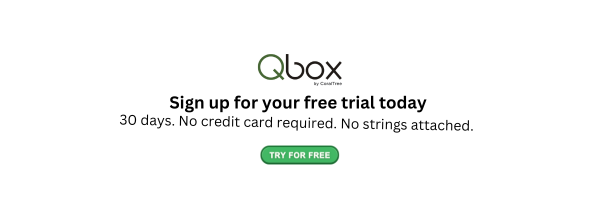Collaboration Software vs. Traditional Accounting Tools: Why Qbox is the Better Choice

Contents
In today’s fast-paced world, businesses are constantly seeking solutions to improve efficiency and collaboration. Accounting professionals, in particular, face increasing pressure to manage client relationships, streamline workflows, and meet tight deadlines. This demand brings us to a critical question: Collaboration Software vs. Traditional Accounting Tools—which is the better choice?
In this blog, we’ll dive deep into the comparison between modern collaboration software and traditional accounting tools, highlighting why Qbox stands out as the superior option for accountants and teams alike.
Understanding the Basics: Collaboration Software vs. Traditional Software
What Is Collaboration Software?
Collaboration software, also known as team collaboration software, is designed to facilitate communication, file sharing, and workflow management within teams. These tools are built for seamless interaction and allow remote collaboration, making them indispensable for modern businesses. Key features include:
- Real-time file sharing
- Cloud-based access
- Task management
- Communication channels
What Is Traditional Accounting Software?
Traditional accounting software refers to legacy tools that were primarily developed for desktop use. These softwares require manual installation and often operate on isolated systems. While they serve their purpose, they fall short in areas like collaboration, mobility, and accessibility.
Key Differences Between Collaboration Software and Traditional Software
Accessibility and Mobility
- Traditional Accounting Software: Restricted to single devices and dependent on manual file transfers.
- Collaboration Software: Cloud-based and accessible from anywhere, enabling team members to work remotely.
File Sharing and Version Control
- Traditional Accounting Software: Files need to be emailed or physically transferred, increasing the risk of duplication and outdated versions.
- Collaboration Software: Allows real-time file sharing and updates, ensuring everyone works on the latest version.
Scalability
- Traditional Accounting Software: Limited in scope and challenging to scale.
- Collaboration Software: Scalable to meet growing business needs, accommodating team expansion and increasing data requirements seamlessly.
Security and Data Protection
- Traditional Accounting Software: Security is dependent on local systems, which are vulnerable to breaches or data loss.
- Collaboration Software: Utilizes advanced encryption and cloud-based backups, ensuring robust security.
Why Collaboration Software Outshines Traditional Accounting Software
- Real-Time Collaboration Collaboration software like Qbox enables team members to work on files simultaneously without disrupting workflows. This feature is crucial for accountants managing multiple clients and deadlines.
- Improved Communication With built-in communication tools, team collaboration software eliminates the need for endless email threads. Tools like chat and task assignments keep everyone on the same page.
- Remote Work Friendly Remote collaboration software ensures that accounting teams can work efficiently, whether they’re in the office or working from home.
- Efficient Client Collaboration Client collaboration software streamlines the process of sharing documents with clients securely, collecting e-signatures, and keeping them informed about project progress.
- Time-Saving Automation Collaboration software automates repetitive tasks such as invoice generation, task scheduling, and document sharing, allowing accountants to focus on strategic aspects of their work.
Challenges of Traditional Accounting Software
Limited Collaboration
Traditional accounting software relies on standalone systems, making collaboration cumbersome. Teams often face issues with outdated versions and inconsistent data.
Time-Consuming Updates
Updating traditional software requires significant time and technical expertise, often leading to downtime. Frequent updates may also disrupt workflows.
Restricted Accessibility
Traditional tools often require users to be physically present in the office or use specific devices, limiting flexibility and productivity for remote teams.
Lack of Customization
Most traditional accounting software does not offer customization options to cater to specific business workflows, making it less adaptable to unique organizational needs.
Why Qbox Is the Best Accounting Collaboration Software
What Sets Qbox Apart?
Qbox is a modern accounting collaboration software specifically designed for accountants and bookkeeping professionals. It bridges the gap between the robust features of traditional accounting software and the flexibility of cloud-based tools. Here’s why Qbox stands out:
- File Locking Technology Qbox’s unique file locking feature prevents conflicts by ensuring that only one user can edit a file at a time. This eliminates the risk of overwriting data.
- Secure File Sharing Qbox prioritizes security with end-to-end encryption, ensuring your clients’ sensitive financial data is safe.
- Enhanced Remote Collaboration Qbox allows teams to access and work on files from any location, making it the best collaboration software for remote teams.
- User-Friendly Interface The intuitive design of Qbox ensures that both accountants and their clients can navigate the platform with ease, minimizing the learning curve.
- Cost-Effective Solution Qbox provides a cost-efficient way to improve collaboration without requiring heavy investments in additional hardware or IT resources.
Key Features of Qbox: All-in-One Accounting Collaboration Software
The Qbox Collaboration Suite
Qbox is more than just a file-sharing tool; it’s an all-in-one collaboration software designed to streamline every aspect of accounting workflows. Its suite includes:
- Client Portal: A secure space for sharing documents and communication with clients. The client portal ensures that sensitive files are only accessible to authorized users, offering both convenience and top-notch security. This feature eliminates the need for back-and-forth emails, providing clients with a centralized hub for all interactions.
- Electronic Signatures: Simplify the signing process for contracts and approvals. With Qbox, documents can be signed digitally in a matter of minutes, ensuring faster approvals and minimizing delays in workflows.
- Tasks and Workflows: Qbox offers a clear view of project timelines and individual responsibilities, making it easy to monitor progress and ensure that no task is overlooked.
- Team Chat: Communicate in real time with team members. Whether discussing a client’s account or clarifying project requirements, the chat feature ensures quick and effective communication without the need for third-party messaging tools.
- Invoicing: Create, send, and track invoices directly within the platform. The invoicing feature not only simplifies billing but also allows teams to monitor payment statuses, set reminders, and generate reports for financial analysis.
With these features, Qbox transforms traditional accounting workflows into seamless, collaborative experiences.
Conclusion
When comparing collaboration software vs. traditional accounting tools, the benefits of modern solutions like Qbox are undeniable. Collaboration software offers superior accessibility, scalability, and security, making it the ideal choice for accounting professionals who value efficiency and teamwork.
Why settle for outdated, restrictive tools when Qbox provides a seamless, secure, and collaborative experience? It’s time to elevate your accounting practice with Qbox’s innovative features and unlock the full potential of team collaboration software. Schedule a demo today!

